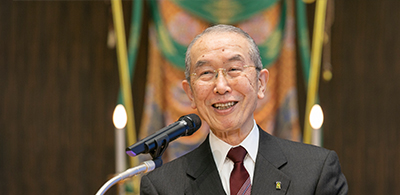Returning to Your True Self
January 2020

Returning to Your True Self
Happy New Year! Here is a poem quite appropriate for this season:
Although a year is a shapeless period of time,
It spreads out bountifully before me.
—Satarō Satō
This rich expanse of brand-new time lies before us as we welcome the new year. In this case, no one but we ourselves can make this coming year something truly rich and rewarding.
This is because we are always the cause and condition of our everyday encounters with all people and things. Put differently, if we can accept that there is no thing—even the events happening in a world far away—to which we are not connected, then we can say that whatever kind of year we have is entirely up to us.
This means that you should consider how you will grow and make progress in the course of the coming year. In chapter 9 of the Lotus Sutra, “The Assurance Given to Those Trained and Still in Training,” Shakyamuni’s only son Rahula, as well as his constant attendant Ananda, receive the assurance that they, too, will certainly become buddhas. When Shakyamuni gives Rahula his assurance, he praises him, saying that “Rahula’s unseen practices / Are known to me alone.” The Buddhist scholar Fumio Masutani (1902–87) wrote that while Rahula was not blessed with the wisdom of Shariputra or the eloquence of Purna, he developed into “the most meticulous practitioner who undertook ‘unseen’ practices, that is, who protected and kept order in the Sangha through the strenuous support by those who watched over him as well as his own painful efforts.”
I think I am not alone in feeling sympathy for Rahula, who—in contrast to Shariputra, respected as the master of wisdom, and Purna, respected as the master of eloquence—was not blessed with any special talent. Therefore, in thinking about how we can develop ourselves and make progress, we should pay attention to the kind of effort Rahula made.
Honestly, Humbly
In Shakyamuni’s congregation, one’s age and worldly social standing were irrelevant. Instead, the persons who renounced the world the earliest were given seniority and allowed to be the first to enter the temple chambers reserved for religious practices.
At one time, Shakyamuni and Rahula were staying at the Jetavana Monastery. Rahula arrived at the monastery ahead of some of his senior practitioners and immediately gave his room to them, leaving him with no room of his own. There was nothing for Rahula to do but sleep before the entrance of Shakyamuni’s room.
It is also recorded that on one occasion, a person who knew that Rahula was Shakyamuni’s son threw sand into his alms bowl and struck his head. Even so, Rahula quietly endured such abuse.
Rahula is praised as being “foremost in unseen practices.” However, I think he was given such praise because he meekly listened to the guidance and advice given to him by his seniors, including Shariputra, was humbled by it, and continued to learn and practice the teaching steadfastly even when others weren’t watching. By birth he was Shakyamuni’s oldest and only son, and before he renounced the world, he asked his father Shakyamuni to “please give me the assets of the royal palace.” But after he became a monk, when he understood that the most important thing in life was to continue pursuing the Dharma, he became modest, with the mind to always be honest and humble. This attitude of accumulating quiet diligence—these “unseen practices”—is the great effort of Rahula.
Within Rahula’s efforts, there was no coveting of wealth, resentment of personal circumstances, or arrogance about being the son of Shakyamuni. By accumulating his “unseen practices,” Rahula awakened to the preciousness of the buddha-nature inherent in all people, which allowed him to be free of the delusions of greed, anger, and ignorance. He returned to his true self.
No matter who you are, you can return to your true self. Never forgetting our meekness and humility and living each day as if it were our last, let’s spend this year making our best efforts to be cheerful and kind.




